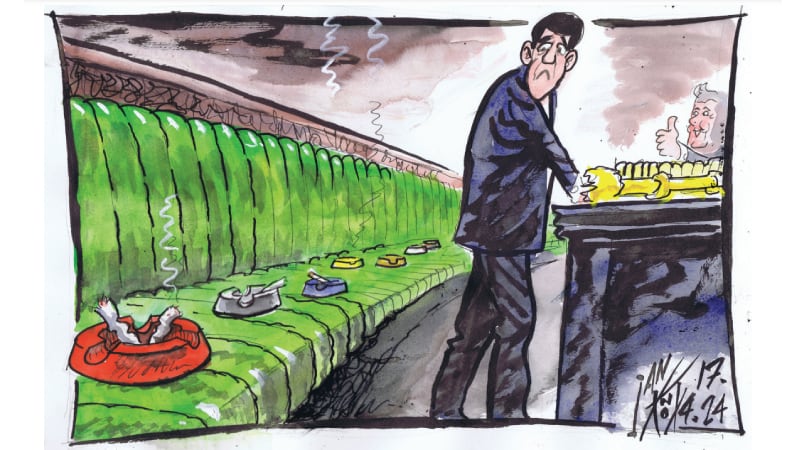LAST Monday marked three years since the New Decade New Approach agreement was reached. Remember New Decade New Approach and all the hope that it ushered in for this decade? Three years later and the agreement lies in tatters and policy pledges fluttering in the wind.
Today, the DUP is preventing the function of government at a time when our health service teeters on the brink of collapse. People are being priced out of existence by corporate greed and a dependence on fossil fuels which are destroying our planet. The last time, it was Sinn Féin that prevented government for three years.
This year also marks 25 years since the Good Friday Agreement was signed, another time of hope and expectation for something better – sustainable politics and a peace process that improved the day-to-day lives of the people that had endured so much during the conflict.
The negotiations that brought about the Good Friday Agreement were inclusive in nature. Minority voices had seats at the table and made critical contributions. The role played by the Women’s Coalition, for example, was immense, helping to knock old heads together and speaking on the part of people who had rarely had their voices heard before.
However, since then our politics has become exclusionary. There has been a consolidation of power through various agreements and arrangements and today we sit with three main power blocks in Sinn Féin, the DUP and Alliance. The problem is that these three main parties clearly can’t do business together. Our system of government was intended to be pluralist, not exclusionary and mirroring the Westminster system.
Yet, the British government continue to press on with behind closed door round tables and negotiations. This is rinse and repeat Northern Ireland politics. A deal cooked up by vested interests which promises to be different but inevitably leads to crises and collapse again.
A return to inclusive politics is needed now more than ever. That’s why I am calling for citizen assemblies, dealing with issues that matter most to people such as climate breakdown, the future of health care and sustainable competent government.
With Northern Ireland having no government more than 40 per cent of the time since 1998, it is clear that repeating the same process with the same parties won’t work. Instead, empower the people to provide the solutions.
MAL O’HARA
Leader, Green Party NI
Ireland must do what is right for humanity
The year 2022 has been a relatively good year for most Irish people (except our most vulnerable children and homeless). The government has used the bonanza of corporation tax, not to fund the health services or the housing crisis, but mainly to benefit those already well off. Ireland has been very much an outlier compared with most of humanity many of whom have experienced war, starvation, human rights abuse, dire poverty, and the destruction of their living environment. Due to its privileged position on the UN Security Council, the Irish government was in a unique position throughout 2022 to use our traditional altruistic foreign policy, the foundation of which has been our policy and practice of active neutrality, towards promoting international peace and justice. Shamefully, it failed to do so, and instead joined the militaristic coalition of the west against the rest. Apart from fulfilling our humanitarian duties to give shelter to Ukrainian refugees, which we generously did, Ireland had nothing of value to give towards the defence of Ukraine, except our now abandoned ability to promote peace. Irish and European Union treatment of other refugees and asylum seekers from the most impoverished and conflict torn regions of Middle East and Africa has been in marked contrast with our genuine humanitarian response to Ukrainian refugees. Sally Hayden’s book, My Fourth Time, We Drowned documents the shocking reality that our European Union has abandoned its duties to rescue the drowning and provide asylum for refugees of all ethnic backgrounds. The undeclared famine in the Horn of Africa and Yemen is a crime against humanity given that there is no overall shortage of food throughout the world. Ireland must stop standing idly by and do what is right because it is right.
EDWARD HORGAN
Castletroy, Co Limerick
Protocol and the border
I doubt very much that the British government will be tempted or could afford to use its powers unilaterally and provocatively to try and reinstate a customs border on the island of Ireland, as recommended by Dr D Cooper writing from Maidenhead (January 6). The removal of the hard physical border, including customs posts in Ireland, is integral to the success of the Good Friday Agreement and the maintenance of the peace process, as is well understood by both the British and Irish governments, the EU and the United States, with innumerable public statements on all sides to that effect. Present efforts by all concerned to defuse tensions surrounding the protocol and to make it as user-friendly as possible compatible with its essential function, as well as maximising its potential net advantages to Northern Ireland, deserve every support and encouragement. The aim surely should be to dissipate the heavy weather that has been made of Brexit, rather than seek to create a perfect storm.
MARTIN MANSERGH
Tipperary, Co Tipperary
We should protect our hard-won neutrality
I refer to plans to build British Army Memorials in 2023, for example in our area, Killester, on Dublin’s northside. Many well-meaning people in this country see no harm in the numerous British War Memorials, thinking that they are just remembering the past glories of the British Empire.
Historically, Ireland was a valuable source of food and recruits for the British army and navy.
Even after 100 years of the state, this part of Ireland still supplies a lot of recruits for the British army because of that long tradition, which is kept alive by the practice of supporting the war memorials up and down the country.
It is not okay that Irish youth are made available year after year for recruitment into a foreign army, allowing it to continue to hold onto remnants of its empire with modern ‘interventions’ to support their assets in the modern world. Irish government policy should actively discourage recruitment for foreign armies here.
We should protect our hard-won neutrality by opposing any further British War Memorials in Ireland.
PAT O’CONNOR
Killester, Dublin 5







